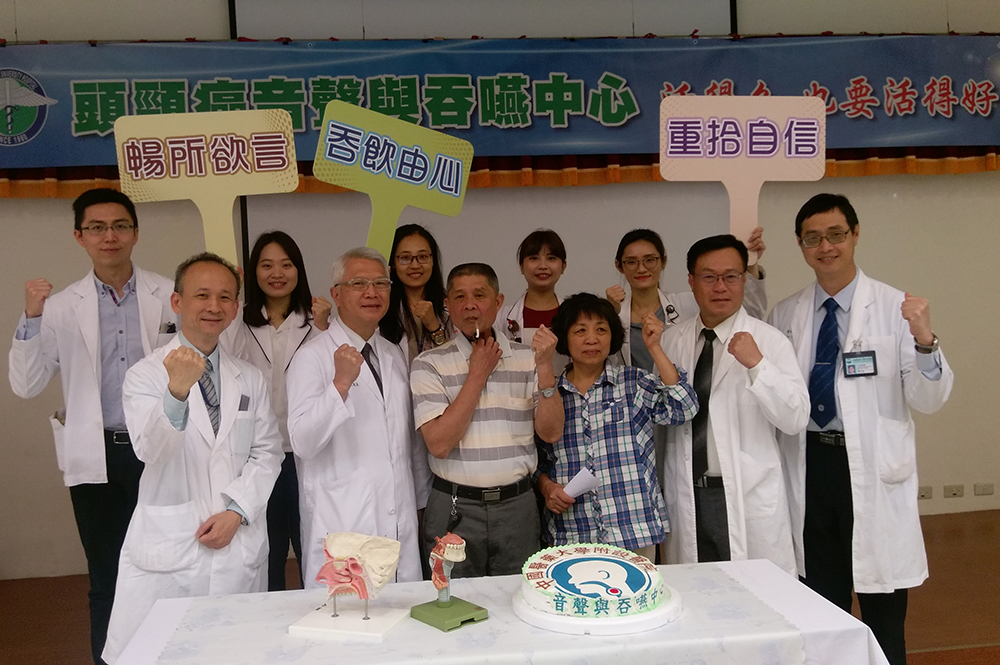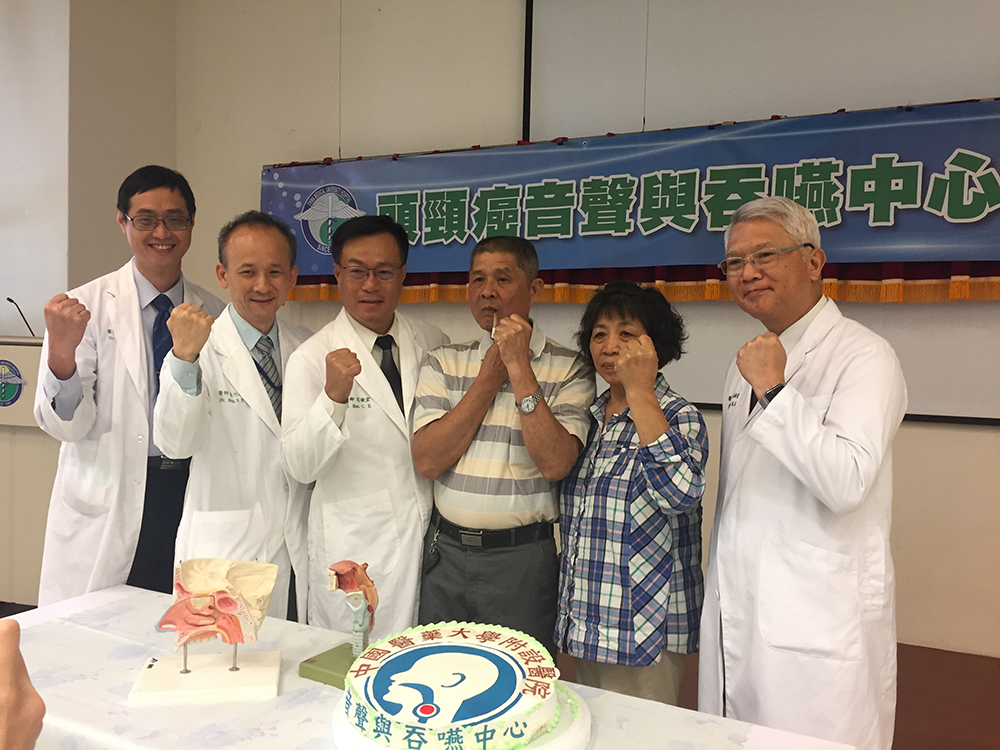News and Award
About CMUH
Speech and Swallowing Function Restoration Center offers complete specialists team.Elevated quality of life for post-treatment patients with oral or throat cancer

In Taiwan, the prevalence and mortality of oral cancer are increasing and the incidence rate has grown for 30% in the past five years, hence, it becomes the sixth out of ten most common cancers in Taiwan (fourth out of ten most common cancers in males). Techniques in operation, chemotherapy, or radiation therapy for oral and throat cancers have been improved continuously and bring about prognosis improving; however, there was no significant improvement about restoration of life function after cancer treatment. Head and neck cancer patients who suffer from disturbance of swallowing and speech have greater demand of regaining their original quality of life on good appetite and more clear speaking. China Medical University Hospital has integrated cross-department specialists and led to establish the “Speech and Swallowing Function Restoration Center” to assist post-treatment head and neck cancer patients (oral cavity, nasopharynx, oropharynx, laryngeal and hypopharynx cancers) to rebuild the healthy life by precision instruments and collaborative team works .
According to the study conducted by the Taiwan Cancer Registry, the incidence of oral cancer in Taiwan ranks first in the world and which brings a huge impact on the health of our people. Mr. Chen, aged 67, was one of the beneficiaries of the center. He suffered from hypopharyngeal cancer 10 years ago and received pharyngolaryngectomy in combination with radiation and chemotherapy. That brought to unavoidable impacts on functions of swallowing and phonation that had made him feel very depressed and worsened his quality of life. Chun-Hung Hua, Director of Department of Head and Neck Surgery, his attending physician, actively encouraged him for rehabilitation. Since the establishment of “Speech and Swallowing Function Restoration Center”, the energy has been advanced farther in patients’ post-surgery rehabilitation and care. Mr. Chan had cooperated to rehabilitate, and now he has not only recovered from the pre-surgery swallowing function and smoothly speaking and communicating by assistance of speech prosthesis, the hypopharyngeal cancer is not recurrent, and his life now is healthy and happy.
Multi-disciplinary treatment for head and neck cancer
High-quality treatment raises survival rates for patients
Director Hua Chun-Hung indicates that the principle of head and neck cancer treatment is to consider the tumor site and size, neck or distant lymph node metastases, patient’s age, strength, and family factors, etc. After having a fully communication with the patient and families, a most appropriate treatment would be established.
There are a couple of weapons to fight head and neck ccancers; for examples, radical operations, ardiation therapy, cytotoxic chemotherapy, target biotherapyand , and immune therapy. The treatment policy for different site cancers differs. For nasopharynx carcinoma, radiation therapy combined with chemotherapy would be the most popular treatment strategies. On the other hand, for advance-staged oral cavity cancers, radical operations followed badjuvent radiation therapy(or chemo-radiation therapy) would be the best choice.

The early the speech and swallowing rehabilitation intervenes, the less side-effects occur after treatment
Currently, the incidence of oral and laryngeal cancer in Taiwan ranks sixth nationwide, and the number of patients with head and neck cancer in our hospital performed brilliantly compared to other domestic medical centers. In the aspect of treatment quality over the surgery, radiation, and chemotherapy, our hospital has outstanding performance in recent 10 years as the other domestic medical centers. Our cancer treatment is not inferior to the advanced countries; yet, there has a lack of complete and sophisticated medical services for post-treatment patients with dysfunctions of chewing, swallowing, speaking, aesthetics, and stiff shoulder muscles.
Director Tsou Yung-An, Department of Laryngology, Otorhinolaryngology, China Medical University Hospital indicates that the Speech and Swallowing Function Restoration Center established in November 2016 aims to improve and prevent various cancer treatment-related complications, such as dysarthria, voice disorder, swallowing disorder, head and neck lymphedema, neck soft tissue fibrosis and contracture, lockjaw, shoulder joint contracture, etc. To patients who received surgery and radiation therapy, the center will schedule appointments of verbal therapy at the outpatient clinic which emphasizes swallowing rehabilitation exercises to avoid the degeneration or structural changes of the pharyngeal functions from treatments-induced pain and discomforts that further effects the long-term prognosis on voice and swallowing functions. Our center will routinely evaluate the voice and swallowing functions after the verbal therapy. Once we find a regression of the functions, early intervention will be done. Patients are expected to receive rehabilitation therapy at our center to reduce the impairment of swallowing and speech functions.
Tsai Ming-Hsui, Deputy Superintendent, China Medical University Hospital, indicates that the vast majority of oral and hypopharyngeal, and esophageal cancer are related to the betel nuts chewing and smoking. Although people do know that betel nuts and smoking are harmful, the head and neck cancers in Taiwan has risen steadily in recent years. Please do not take any chances and live on spec, go for the formal medical services and do not delay medical diagnosis.
Chun-Hung Hua, Director of Department of Head and Neck Cancer, Otorhinolaryngology, China Medical University Hospital



![[Taiwan–Malaysia Medical Innovation Forum] CMUH and UNIMAS Co-Host Major Medical Symposium to Advance Medical Technology and Precision Patient Care img](/FileUploads/News/20250714_131324.jpg?w=250&h=180&mode=crop&scale=both)